Coding is for ALL – Celebrating the Diverse History of Computer Science!
This month is Pride Month, and so here at The Code Zone we want to bring some attention to some amazing LGBTQ+ coders throughout history who have made our lives so much more amazing with their inventions and ideas. We believe coding is for all people, and the history of computer science shows that this works out in the world’s favour!
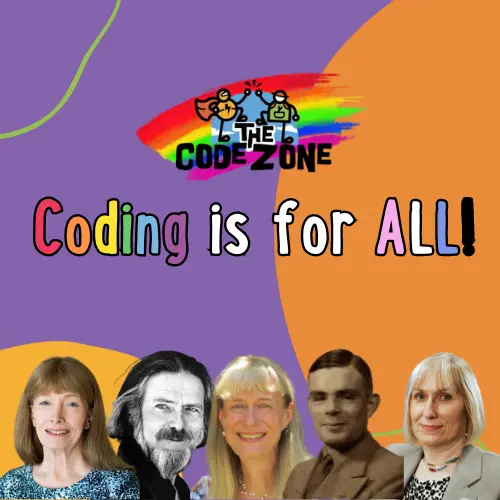
In the past two decades, our life has quickly become intertwined with the amazing technology all around us. Perhaps this morning you sent out an email to a colleague, or a text message to a friend, and no doubt you’ve used a laptop or phone in the last few days – I’m not sure how you’re reading this if you haven’t! With devices ranging from games consoles to smart fridges, our lives are electric and bright, and without computer technology, I’m sure we’d all feel a little in the dark.
But it’s so easy to forget that for every screen you see, every video game you play and every button you press, there was an amazingly talented bunch of coders and engineers that got it into your hands! They painstakingly carved out a world for us that we know and love, using their brilliant brains and years of hard work to code, design, and understand the logic of computing.
Now, we all remember names like Bill Gates and Steve Jobs when we think of computers – big famous CEOs who there are no end of articles and info about. But what’s remarkable (and quite sad) is that some people whose coding inventions and achievements are equally, or maybe even more influential as the famous juggernauts I mentioned, have nowhere near the fame or attention. Have a think about it – do you know who came up with the idea for adding attachments to emails, or designed the processor chip inside your phone? I’m sure you’d agree they deserve some fame!
This month is Pride Month, and so here at The Code Zone we want to bring some attention to some amazing LGBTQ+ coders throughout history who have made our lives so much more amazing with their inventions and ideas. We believe coding is for all people, and the history of computer science shows that this works out in the world’s favour! So let’s have a look at some marginalised computer scientists and give them the appreciation they deserve, shall we?
1) Alan Turing
Alan Turing is hopefully a name you recognise – after all, his incredible work cracking the Nazi ‘Enigma’ code during WWII was instrumental in the Allied victory. It might be a bit of a surprise to see such a famous coder listed as someone ‘forgotten’ or ‘underappreciated’! But unfortunately, Turing’s legacy has been vastly understated even despite how famous his wartime efforts were.
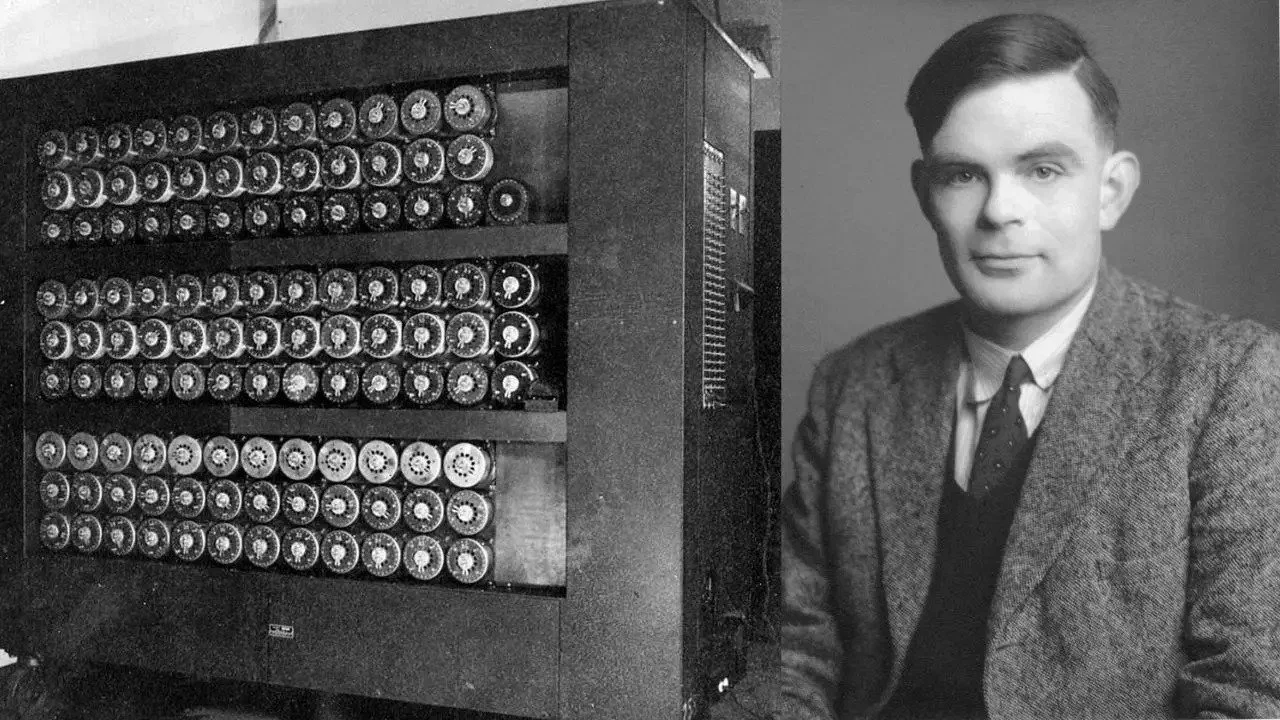 The device used to crack the Enigma code, known as the Turing Machine, was not just a complex code-cracker. It was also the embodiment of his idea to create a ‘mechanical brain’ (also known as a computer!), the first of its sort that could complete different instructions if you gave it different outputs. The principles of Turing’s ideas are still used to this day, and form the foundation of what we know as computer science!
The device used to crack the Enigma code, known as the Turing Machine, was not just a complex code-cracker. It was also the embodiment of his idea to create a ‘mechanical brain’ (also known as a computer!), the first of its sort that could complete different instructions if you gave it different outputs. The principles of Turing’s ideas are still used to this day, and form the foundation of what we know as computer science!- He also designed a device known as ACE – short for Automatic Computing Engine – that is hailed as one of the first modern computer designs.
Alan Turing continued to work hard after the war, though his possible future contributions to computing were cut short when he was arrested in 1952, for the ‘crime’ of being a gay man. His legacy was besmirched, he was treated horribly by the British government that owed him their survival through the war, and he tragically died of suicide in 1954 as a result. If the society he lived in had valued his abilities and service to humanity above his harmless identity and sense of love, perhaps computer science would be leaps and bounds ahead of where it is now.
2) Christopher Strachey
Christopher Strachey was another computer scientist from the 1950s, and like Alan Turing, his contributions echo throughout history! He was a brilliant mind, and especially relevant to The Code Zone because…
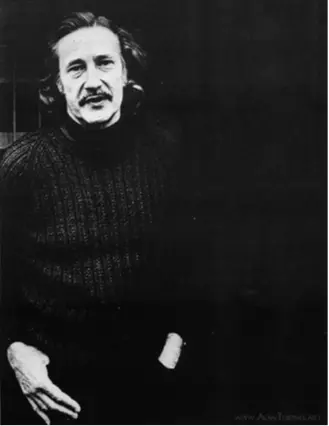 He invented one of the first video games! Though other simple games were being developed around the same time, Strachey’s game was a cut above the rest – he remade the classic game Checkers in computer format, and you were able to play against the computer itself! Interestingly, the game was created using Alan Turing’s ACE.
He invented one of the first video games! Though other simple games were being developed around the same time, Strachey’s game was a cut above the rest – he remade the classic game Checkers in computer format, and you were able to play against the computer itself! Interestingly, the game was created using Alan Turing’s ACE.- He programmed the first music on a computer – if you’re a fan of video game tunes, just know it was made possible by Strachey!
- Probably most importantly, he created the CPL coding language, which is the ancestor of C and many other coding languages that are now vital in modern computer science.
- He even coded a program that wrote love letters, the first iteration of computer-generated literature in history.
Like Turing, Strachey was a gay man and lived his life in fear of being discovered for it. Few recognise his name, despite his importance! If we owe such a huge amount to people like Strachey, then we need to be sure to include them in our coding spaces – imagine if we’d missed out on his ideas.
3) Mary Ann Horton
Mary Ann Horton was another amazing person whose inventions we use all the time. If you’ve ever had to email completed homework to a teacher, a picture to a friend, or a document to the doctor – Mary Ann made that possible!
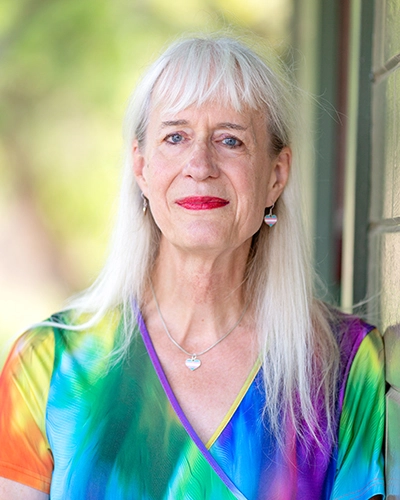 Horton invented the ability to attach files to emails, something that makes them far more versatile and useful and is used all around the world, millions of times a day. She changed emails from just a bunch of words sent from person to person into a way of transferring complex information, which was then copied into the foundation for modern messaging systems!
Horton invented the ability to attach files to emails, something that makes them far more versatile and useful and is used all around the world, millions of times a day. She changed emails from just a bunch of words sent from person to person into a way of transferring complex information, which was then copied into the foundation for modern messaging systems!
Mary Ann Horton was a trans woman, undergoing her transition as she made her monumental contribution to technology. She is just another example of someone from a marginalised group creating the foundations for our world, with nowhere near the recognition she deserves!
4) Sophie Wilson
If you’re reading this (or anything!) on a phone… or a tablet, or a watch, or a fridge – Sophie Wilson made it possible. We have her to thank that we can put miniature gadgets inside of even the most normal things, and of course for our ever-important mobile phones.
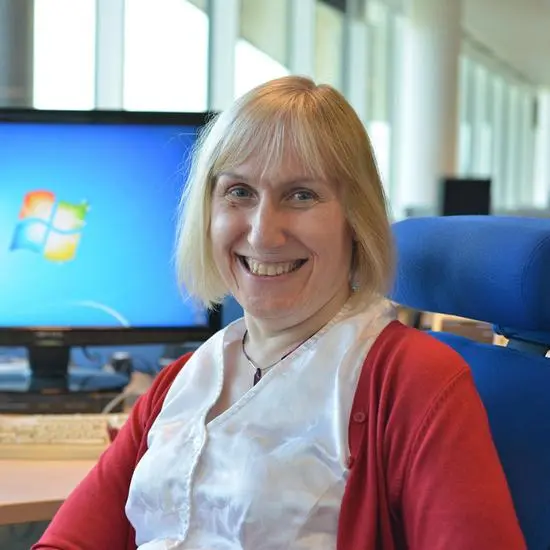 Sophie Wilson designed a way in which computers could be given far smaller instructions while still working effectively, working with her team to eventually create the ‘ARM’ microchip, a type of computer chip that would go on to be inside of ~95% of mobile phones!
Sophie Wilson designed a way in which computers could be given far smaller instructions while still working effectively, working with her team to eventually create the ‘ARM’ microchip, a type of computer chip that would go on to be inside of ~95% of mobile phones!- She also led the creation of the BBC Micro, an educational computer that was released alongside the BBC starting educational programmes on computer science, inspiring generations of coders!
I personally couldn’t imagine my life without my mobile phone – it’s become such a huge part of modern life. But it seems a huge injustice to have not known that Sophie – another trans woman in computer science – was responsible for making it all work. Each and every one of us is in her debt, and we can repay her in part by welcoming trans people into coding, as fellow pioneers!
5) Lynn Conway
Last but certainly not least is Lynn Conway. She was a professor at MIT and a transgender activist, being a trans woman herself, and was responsible for fantastic advances in the electronics industry as well as in the field of microprocessors, with her face even being proudly printed on the standard textbook for chip design at the time. Her insight is still used to this day.
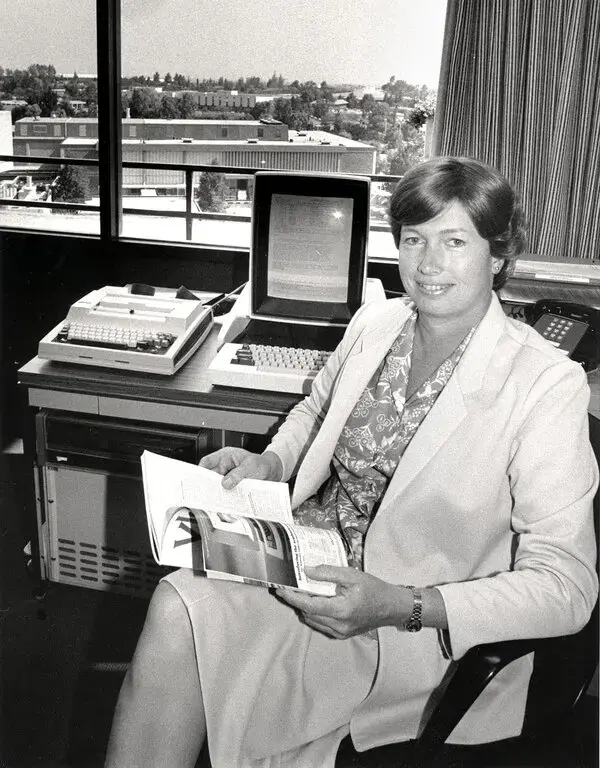 Conway pioneered something called VLSI – which means Very Large Scale Integration. In simple terms, it was a way of designing computer chips that got around the problems that were stopping progress into developing more powerful computers – the kind we use today!
Conway pioneered something called VLSI – which means Very Large Scale Integration. In simple terms, it was a way of designing computer chips that got around the problems that were stopping progress into developing more powerful computers – the kind we use today!- She changed the old fashioned methods of designing chips with painstaking sketches using pen and paper, into a super-fast digital method that allowed for millions of details to be added in a fraction of the time originally needed.
Conway was the victim of discrimination during her life, even being sacked by the company she worked for when she revealed she wanted to transition. It took the company over 50 years to apologise for their blatant mistreatment of her, despite how her work changed the computing world over those years. Her story stands as a reminder that pushing away talented minds because of their identities is as unfair as it is self-sabotage!
As we can see from these five brilliant souls, members of the LGBTQ+ community have a huge amount to offer us as coders: time and time again they’ve been responsible for amazing inventions that don’t just change computers, but the whole world too! Next time you send an email with an attachment or open up your phone, maybe you’ll remember the people we owe those luxuries to – and hopefully over time their names will be as memorable as they ought to be. Happy Pride everyone, take care, and keep coding – no matter who you are!






